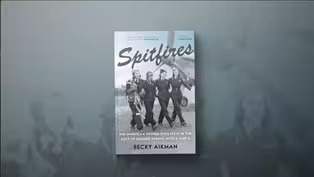
How auto parts tariffs may affect new and used car prices
Clip: 5/4/2025 | 5m 2sVideo has Closed Captions
How tariffs on imported auto parts may affect car prices and repair costs
Trump has seemed to shrug off worries that his trade tariffs will raise prices on everyday items for Americans. Prices on new and used cars are likely to go up due to the 25 percent levies on imported auto parts, which took effect this weekend, and on imported cars, which have been in place for nearly a month. John Yang speaks with Erin Keating, executive analyst at Cox Automotive, for more.
Problems playing video? | Closed Captioning Feedback
Problems playing video? | Closed Captioning Feedback
Major corporate funding for the PBS News Hour is provided by BDO, BNSF, Consumer Cellular, American Cruise Lines, and Raymond James. Funding for the PBS NewsHour Weekend is provided by...

How auto parts tariffs may affect new and used car prices
Clip: 5/4/2025 | 5m 2sVideo has Closed Captions
Trump has seemed to shrug off worries that his trade tariffs will raise prices on everyday items for Americans. Prices on new and used cars are likely to go up due to the 25 percent levies on imported auto parts, which took effect this weekend, and on imported cars, which have been in place for nearly a month. John Yang speaks with Erin Keating, executive analyst at Cox Automotive, for more.
Problems playing video? | Closed Captioning Feedback
How to Watch PBS News Hour
PBS News Hour is available to stream on pbs.org and the free PBS App, available on iPhone, Apple TV, Android TV, Android smartphones, Amazon Fire TV, Amazon Fire Tablet, Roku, Samsung Smart TV, and Vizio.
Providing Support for PBS.org
Learn Moreabout PBS online sponsorshipJOHN YANG: Good evening.
I'm John Yang.
Today, President Trump seemed to shrug off worries that his trade tariffs will raise prices on everyday items for Americans and force some to make do with less.
In an interview broadcast today on NBC's Meet the Press, moderator Kristen Welker asked him about predictions that prices on children's toys will go up.
DONALD TRUMP, U.S. President: I don't think a beautiful baby girl needs that's 11 years old, needs to have 30 dolls.
I think they can have three dolls or four dolls because what were doing with China was just unbelievable.
We had a trade deficit of hundreds of billions of dollars with China.
KRISTEN WELKER, NBC News Host: When you say they could have $3 instead of $30, are you saying you say they don't need Americans could see empty store shelves?
DONALD TRUMP: No, no, I'm not saying that.
I'm just saying they don't need to have $30.
They can have three.
They don't need to have 250 pencils, they can have five.
JOHN YANG: Prices on new and used cars are likely to go up because of the 25 percent levies on imported auto parts which took effect this weekend, and on imported cars which have been in place for nearly a month.
Erin Keating is executive analyst at Cox Automotive.
Erin, the tariff on auto parts is going to affect even cars made in the United States using components that are from foreign countries.
Is it possible to say how soon and by how much Prices are going to start to increase.
ERIN KEATING, Executive Analyst, Cox Automotive: Sure.
I mean, we've heard that from most automakers.
They're going to hold their MSRP, which is that suggested retail price, for now.
We've heard that some of them are going to wait until June to potentially adjust pricing.
Some of them may start adjusting pricing this may.
But for now, we're seeing a lot more that the pricing dynamics play out at the dealership level because of supply and demand.
Inherently, though, every automaker is going to have to find a way to afford these tariffs.
And so we do anticipate new and used vehicles going up in price over the year.
JOHN YANG: The president sees these tariffs as an incentive to get US Carmakers to bring their supply chains back to the United States.
How quickly could that happen and how costly would that be?
ERIN KEATING: It's a good question.
You know, we know that at a very minimum, it would be 18 to 24 months if you were talking about putting shovels in the ground and building new facilities and new production plants and so forth.
We believe that assembly might be a little bit easier, which will ease that 25 percent tariff on new vehicles crossing the border.
But parts are a very different story.
Manufacturers have been spending a lot of money with our country for decades now building more facilities here in the US.
JOHN YANG: And the effect on consumers, this isn't just going to be about finished product.
There are other ways the cost of car ownership are going to go up.
ERIN KEATING: Absolutely.
I mean, you know, when we're talking about the 25 percent on a vehicle coming over the border, that's really just a new vehicle that we're talking about.
But we know that a majority of our consumers are really looking in the used market.
And if you're owning a car right now and can't maybe afford a new car or maybe can't even afford the used cars that the prices are at, you're trying to repair your vehicle, you're trying to get insurance on those vehicles.
So maintenance and repair are bound to actually be a very universal challenge, cost wise, for all customers, not just individuals looking for new vehicles, because the parts themselves, as you said, came into effect yesterday and they will be tariffed at that 25 percent.
And that will just hurt all of consumers across the board, those that are looking for new cars and those that are needing to maintain and repair older cars.
JOHN YANG: And does it go beyond consumers?
Are dealers going to get squeezed too?
ERIN KEATING: Sure, of course.
I mean, every step of the way between when the car gets built and when it gets moved into the consumer's hands, all of those suppliers, they're helping to build the vehicles.
And a lot of those are small to midsize businesses who might be building that one bolt, that one nut that goes into the vehicle.
Right.
Or it's the dealer that's actually pulling the vehicle onto their lot, paying the manufacturer for that, and then charging the customer to take that car.
So there's a lot of different points in the process where the cost has an opportunity to go up for each stakeholder involved in it.
JOHN YANG: What advice would you give someone who's looking to buy a car in this environment?
ERIN KEATING: You know, the thing that we have right now is we do actually have lots of choice.
I know President Trump was talking about how we don't need $30.
Maybe we only 3.
Well, we do actually have a lot of vehicles on the ground and a lot of options for those that might be a little bit more financially squeezed.
My advice would be to be open minded about which vehicle you're looking at.
There are a lot of different manufacturers.
Everyone is really impacted by this very differently.
It really depends all the way down to the vehicle level how much the tariffs are going to cost the manufacturer.
So be open.
If you're looking for a compact SUV, but you really could fit in a subcompact SUV, you make sure that you're looking at both varieties.
If you typically shop one brand, be open to another brand and really go and do your shopping online.
Use resources like Kelley Blue Book Autotrader and other resources to search and research vehicles and then use your dealer.
They are the best resource for knowing what's available on the ground and how they can get you into a vehicle for your monthly payment.
JOHN YANG: Erin Keating of Cox Automotive, thank you very much.
ERIN KEATING: Thank you.
Family planning clinics lose funding over support for DEI
Video has Closed Captions
Clip: 5/4/2025 | 4m 21s | Family planning clinics lose Title X funding over statements supporting DEI (4m 21s)
News Wrap: Trump says he wants to continue mass deportations
Video has Closed Captions
Clip: 5/4/2025 | 2m 10s | News Wrap: Trump wants to continue mass deportations despite Supreme Court ruling (2m 10s)
‘Spitfires’ tells the story of American women pilots in WWII
Video has Closed Captions
Clip: 5/4/2025 | 5m 50s | ‘Spitfires’ chronicles the daring flights of American women pilots during WWII (5m 50s)
Why young adults finding themselves are lonelier than ever
Video has Closed Captions
Clip: 5/4/2025 | 6m 10s | Why young adults are lonelier than ever and what can be done to help (6m 10s)
Providing Support for PBS.org
Learn Moreabout PBS online sponsorship
- News and Public Affairs

FRONTLINE is investigative journalism that questions, explains and changes our world.

- News and Public Affairs

Today's top journalists discuss Washington's current political events and public affairs.












Support for PBS provided by:
Major corporate funding for the PBS News Hour is provided by BDO, BNSF, Consumer Cellular, American Cruise Lines, and Raymond James. Funding for the PBS NewsHour Weekend is provided by...



